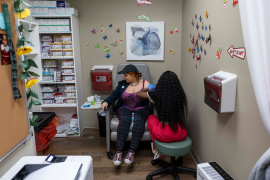Washington, D.C., February 4, 2003—The Commonwealth Fund Task Force on Academic Health Centers today presented a blueprint for the future of the nation's teaching hospitals and medical schools, recommending sweeping changes in clinical practice, research, and education at a time when they are critical to the nation's well-being. The Task Force, which has been studying this issue for seven years, called on teaching hospitals and their affiliated medical schools—known as academic health centers (AHCs)—to rationalize their financial management, take advantage of new technologies in education, and demonstrate greater accountability for what they do. The Task Force also made public policy recommendations that could ensure the survival of academic medicine's vital missions.
The Task Force says that some AHCs are finding it more difficult to survive in the current health care environment, which is becoming both increasingly complex and constrained by rising costs. The Task Force's report, Envisioning the Future of Academic Health Centers, contains more than two dozen recommendations aimed at modernizing and improving the functioning of AHCs.
"The missions of academic health centers are essential to maximizing public health in the United States," said David Blumenthal, M.D., executive director of the Task Force and director of the Institute for Health Policy at Massachusetts General Hospital/Partners HealthCare. "But AHCs must be able to meet the evolving needs of the American people. They will have to learn quickly, act expeditiously, and face change head-on."
The report, Envisioning the Future of Academic Health Centers, also cautions that future funding of AHCs is at risk. In addition to the pressures caused by spiraling health care costs and rising numbers of uninsured, Medicare reforms under consideration by the Bush administration could seriously affect future funding for AHCs, which rely heavily on Medicare for financial support. The Task Force proposes the creation of a public trust fund to provide monies explicitly to support vital AHC missions. Doing so will make the financing more accountable, predictable, and transparent.
West and South In Need of More AHCs
To meet the country's projected health care needs, the national capacity to perform research, teaching clinical innovation, and highly specialized and indigent care—all functions currently performed by AHCs—must increase over time, the Task Force says. That does not necessarily mean that the number of AHCs should be expanded, if other types of organizations can perform those functions. However, the Task Force notes, any growth in AHC capacity should be focused first in the West and the South, which have experienced significant population increases and where there is a dearth of medical schools.
The Task Force's blueprint encourages AHCs to think and act more strategically. On a broad level, they should be more responsive to the needs of the communities they serve. In addition, they should dramatically improve their internal accounting and financial management abilities. They should also develop capabilities for performance measurement and improvement, the Task Force recommends.
In the future, most AHCs will specialize in certain missions; few will attempt proficiency in all areas of research, education, and clinical care, the Task Force predicts. They will seek balance and diversification among the areas they pursue and chart their long-term agendas strategically. Interdisciplinary work will be the norm, especially in research.
Following are some of the Task Force's recommendations in key areas.
Research. The Task Force urges AHCs to bring university-based research and innovation into the mainstream of American health care delivery. Among the Task Force's specific recommendations, AHCs should:
- Become centers of research innovation by giving higher priority and recognition to new and traditionally undersupported areas of biomedical science.
- Focus on translating the results of clinical research into everyday practice.
- Nurture and manage their research relationships with industry in a manner that promotes the public interest, protects patient participants, and maintains academic values.
- Develop capabilities to educate students, residents, and clinicians online and remotely.
- Incorporate simulation in all levels of experience, from students' first encounters with clinical care to continuing education and certification of master clinicians.
- Provide leadership in training a culturally competent clinical and research workforce.
- Work to improve the safety, quality, and efficiency of the services they provide as part of a continual performance improvement process.
- Act decisively to improve outcomes that fall below those obtained by peer institutions—or discontinue those clinical services.
- Become leaders in applying information technology to improve health care.
- Ensure that the quality and efficiency of care provided vulnerable populations are comparable to that available to other populations.
- Work with partners in local communities to serve the needs of poor and indigent patients.
- Adopt explicit programs to train staff at all levels to provide care that is culturally appropriate and responsive to the diverse needs of ethnically and racially varied populations.


